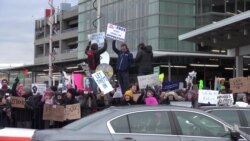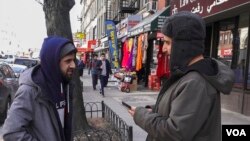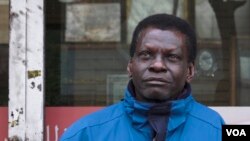Shortly after prayer on a mild winter day, men stop to exchange pleasantries along Brooklyn’s Atlantic Avenue, before heading back to work. It’s a normal occurrence on an ordinary weekday, in what has been a tumultuous year for the New York neighborhood’s Muslim-faith community.
The diverse congregation at Masjid Al-Farooq, the local mosque, includes immigrants from Yemen, Chad and other travel-restricted countries. The community’s outlook — on the one-year anniversary of President Trump’s several times-challenged and revised travel ban, now headed to the Supreme Court — is glum.
“Imagine not seeing your mother, your father, your brother, your sister; imagine them being somewhere else and you know that they’re not safe,” said Ali Abdul, a Yemeni-American, who added that some friends have become more distant because of their dilemmas.
Yemen, mired in a three-year-long civil war, is one of six Muslim-majority countries whose foreign nationals have been barred from entering the United States — necessary, the order says, to protect Americans from terrorist attacks.
But unlike Yemen, included in Trump’s initial ban last January, the Central African nation of Chad popped up in the third version of the order inSeptember, perplexing Chadian immigrants like Hassane Mayo-Abakaka, a permanent resident from Chad and father of five, who has lived in New York City for 19 years.
“Chad is an active member of G5 in Sahel fighting against terrorism in the region,” Mayo-Abakaka said, referring to a five-nation counterterrorism military force in sub-Saharan Africa. “We are victims of terrorism in our country.”
In its September proclamation, the White House cited Chad as a “valuable counterterrorism partner,” but included the country on its list on the grounds of “not adequately” sharing “public-safety and terrorism-relation information,” along with a presence of active terrorist groups in the region.
'Trapped'
Mayo-Abakaka, a business consultant, is intent on creating an international marketing and business corporation connecting the United States, Canada, and French-speaking African nations — an endeavor that would require extensive travel. But for the moment, it is on hold.
As a permanent resident, Mayo-Abakaka has every right to leave and enter the country freely. But since his country was added to the travel ban in September, he says has felt “trapped,” unconvinced of the Department of Homeland Security’s (DHS) next move.
“I can’t travel outside the United States with the risk to not be accepted to come back to my family,” said Mayo-Abakaka, who claimed that some travel companies refuse to accept Chadian travelers.
“When I am thinking about this situation, I get nervous and can’t sleep,” he added in a follow-up text at 4:37 a.m.
During Trump’s initial rollout of the ban, lawful permanent residents were among those detained by U.S. Customs and Border Patrol — a day encapsulated by miscommunication between DHS and airport agents and resulting massive protests across the country.
Today, despite the enhanced security, other permanent residents continue to trek across borders, like 25-year old Mohammed Musleh, an Uber driver from Yemen. But his treatment, he says, has noticeably changed.
“I feel like I’m different,” Musleh said. “They ask you a lot of questions. They take your phone; they have to see inside: ‘What do you have, what pictures you have?’”
‘Maybe we’ll lose everything’
Behind their adjoining desks, travel agent Waddah Mubarez and his two partners wait for their phones to ring, but it’s predictably quiet.
Mubarez, whose Brooklyn, New York company Mubarez Travel caters to a majority-Yemeni population, says bookings have been down by more than 50% over the past year — he approximates 1,200 tickets sold for flights from Djibouti to the U.S. in 2016, compared to 500-600 last year.
“No one can travel,” Mubarez said, aware of its financial implications. “If the ban takes a long time, maybe we should dump the business. Maybe we’ll lose everything.”
But with his ailing mother stuck in Yemen, Mubarez insists his financial future can wait.
“We can live without business, it’s not a big deal,” Mubarez said. “But we can’t live without family.”













